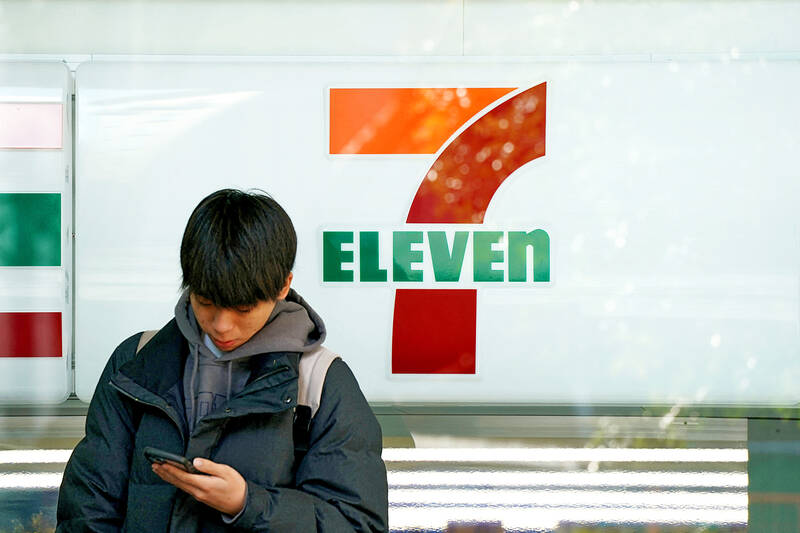Philippine Seven Corp, operator of the 7-Eleven convenience store chain in the Southeast Asian country, plans to invest 5 billion pesos (US$85.32 million) to add more than 400 stores this year, the company’s Taiwanese investor said.
The exclusive licensee to run 7-Eleven stores in the Philippines targeted an increase of 450 stores in its ongoing expansion after growing the number of stores to 4,130 last year, said President Chain Store Corp (統一超商), which holds a 55.32 percent stake in Philippine Seven.
The 7-Eleven chain would be the first to establish a presence in the three major market regions — Luzon, Mindanao and Visayas — in the Southeast Asian nation, the Taiwanese company said.

Photo: AFP
Philippine Seven would focus on shoring up its market share in Mindanao and Visayas, and on opening stores in areas in Luzon, where the chain has no branches, President Chain Store said.
The Taiwanese company acquired a controlling stake in the Philippine company in 2000.
Despite annual losses in 2020 and 2021 due to the COVID-19 pandemic, the Philippine company returned to profit in 2022, and has added more than 350 stores a year since 2023, President Chain Store said.
In October last year, Philippine Seven opened its 4,000th store in Pasay, as the company marked 7-Eleven’s 40th anniversary in the country.
Uni-President Enterprises Corp (統一企業) chairman Alex Lo (羅智先) told a shareholders’ meeting last year that there is plenty of space for the chain to grow in the Philippines, given its population of more than 100 million.
“The sector is not too crowded, and we are the only one who runs the business efficiently,” Lo said.
The chain in the Philippines is still a retailer focusing on selling goods, compared with 7-Elevens in Taiwan, which offer a range of services, he said.

Hon Hai Precision Industry Co (鴻海精密) yesterday said that its research institute has launched its first advanced artificial intelligence (AI) large language model (LLM) using traditional Chinese, with technology assistance from Nvidia Corp. Hon Hai, also known as Foxconn Technology Group (富士康科技集團), said the LLM, FoxBrain, is expected to improve its data analysis capabilities for smart manufacturing, and electric vehicle and smart city development. An LLM is a type of AI trained on vast amounts of text data and uses deep learning techniques, particularly neural networks, to process and generate language. They are essential for building and improving AI-powered servers. Nvidia provided assistance

GREAT SUCCESS: Republican Senator Todd Young expressed surprise at Trump’s comments and said he expects the administration to keep the program running US lawmakers who helped secure billions of dollars in subsidies for domestic semiconductor manufacturing rejected US President Donald Trump’s call to revoke the 2022 CHIPS and Science Act, signaling that any repeal effort in the US Congress would fall short. US Senate Minority Leader Chuck Schumer, who negotiated the law, on Wednesday said that Trump’s demand would fail, while a top Republican proponent, US Senator Todd Young, expressed surprise at the president’s comments and said he expects the administration to keep the program running. The CHIPS Act is “essential for America leading the world in tech, leading the world in AI [artificial

DOMESTIC SUPPLY: The probe comes as Donald Trump has called for the repeal of the US$52.7 billion CHIPS and Science Act, which the US Congress passed in 2022 The Office of the US Trade Representative is to hold a hearing tomorrow into older Chinese-made “legacy” semiconductors that could heap more US tariffs on chips from China that power everyday goods from cars to washing machines to telecoms equipment. The probe, which began during former US president Joe Biden’s tenure in December last year, aims to protect US and other semiconductor producers from China’s massive state-driven buildup of domestic chip supply. A 50 percent US tariff on Chinese semiconductors began on Jan. 1. Legacy chips use older manufacturing processes introduced more than a decade ago and are often far simpler than

Gasoline and diesel prices this week are to decrease NT$0.5 and NT$1 per liter respectively as international crude prices continued to fall last week, CPC Corp, Taiwan (CPC, 台灣中油) and Formosa Petrochemical Corp (台塑石化) said yesterday. Effective today, gasoline prices at CPC and Formosa stations are to decrease to NT$29.2, NT$30.7 and NT$32.7 per liter for 92, 95 and 98-octane unleaded gasoline respectively, while premium diesel is to cost NT$27.9 per liter at CPC stations and NT$27.7 at Formosa pumps, the companies said in separate statements. Global crude oil prices dropped last week after the eight OPEC+ members said they would